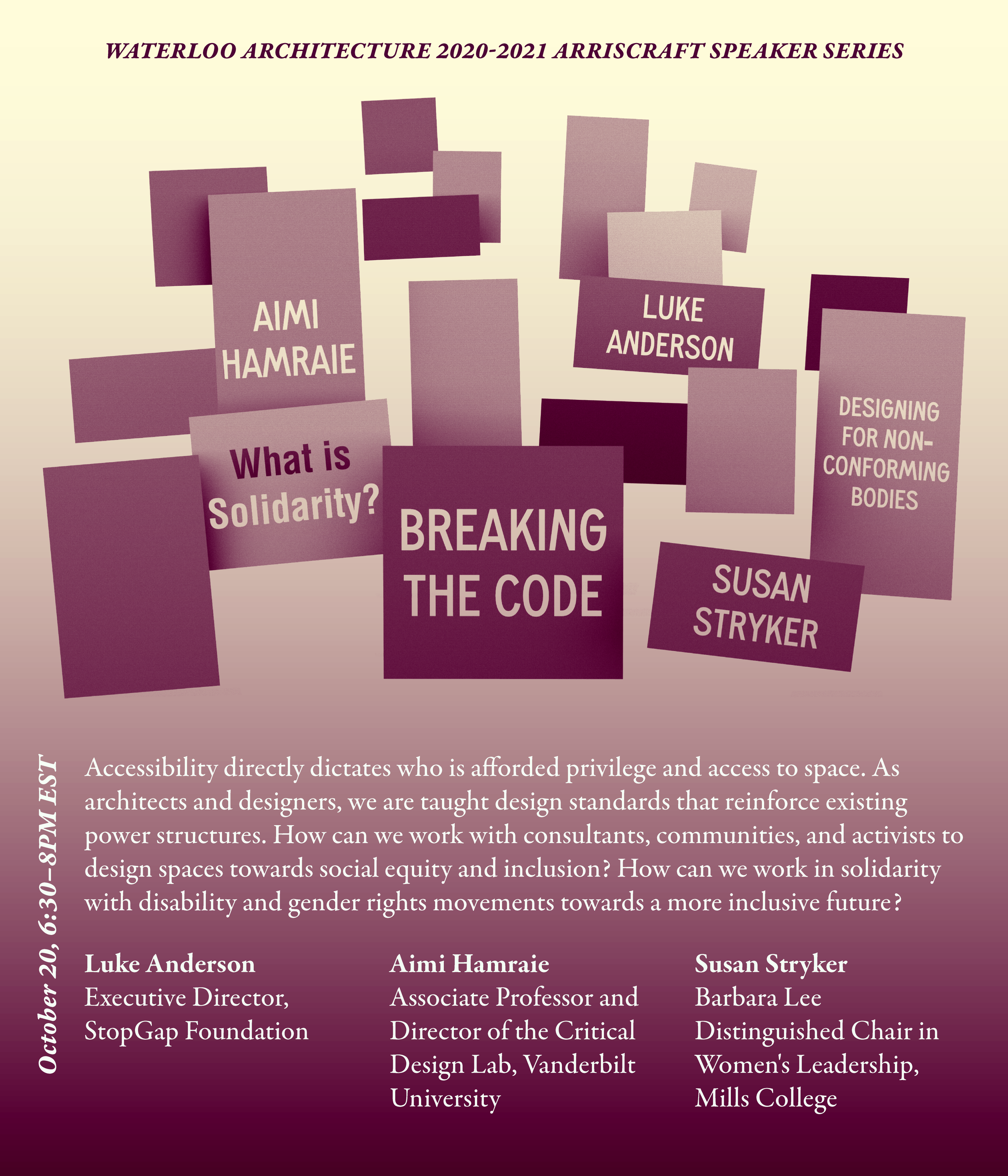
What
is
Solidarity?

Movements,
research,
and
design
for
another
world
WATERLOO
ARCHITECTURE
ARRISCRAFT
2020-2021
ONLINE
SPEAKER
SERIES
BREAKING THE CODE
Luke
Anderson,
Executive
Director
at
StopGap
Foundation
Aimi
Hamraie,
Associate
Professor
of
Medicine,
Health,
&
Society
and
American
Studies,
and
Director
of
the
Critical
Design
Lab,
Vanderbilt
University
Susan
Stryker,
Barbara
Lee
Distinguished
Chair
in
Women's
Leadership
at
Mills
College
Moderated
by
Fiona
Lim
Tung
(she/her),
Lecturer,
Waterloo
Architecture;
with
Vic
Mantha-Blythe
(she/her),
Master
of
Architecture
Candidate,
Waterloo
Architecture
In 2017, the Waterloo School of Architecture underwent an accreditation evaluation. Of the thirty-one criteria which accessed the curriculum, the school did not meet the requirements in only four areas. Accessibility was one of them. Often in both architectural education and in the broader profession, accessibility is not prioritized as a guiding design principle - and yet it directly dictates who is afforded privilege and access to space. As architects and designers, we repeat design standards that reinforce existing power structures. How can we work with consultants, communities, and activists to design spaces that better serve the goal of social equity and inclusion? This conversation explores how architects can work in solidarity with disability and gender rights movements to challenge existing design standards and understand what tools our architectural education affords to create a more inclusive and accessible future.
Luke Anderson (he/him) After sustaining a spinal cord injury in 2002, Luke Anderson was all of a sudden introduced to a world that's not well suited for a wheelchair user. His frustration encountering access barriers led him to co-found the StopGap Foundation, which raises awareness about the importance of a barrier free and inclusive society. StopGap works with different community leaders across Canada delivering education and resources that inspire societal perspective shifts, the removal of barriers in the build environment, and policy change. Their iconic brightly painted ramps can be found in more than 60 communities from coast to coast to coast helping ensure our society's collective understanding about the importance of accessibility and inclusion continues to advance and grow. Luke is a licensed professional engineer, a nature lover, an avid meditator, an aspiring harmonica virtuoso, and is the recipient of a Governor General's Meritorious Service Medal.
Aimi Hamraie (they/them) is Associate Professor of Medicine, Health, & Society and American Studies at Vanderbilt University, which is located on the original homelands of the Cherokee, Shawnee, Chickasaw, and Yuchi people. Hamraie’s interdisciplinary research spans critical disability studies, science and technology studies, design and urbanism, critical race theory, and the environmental humanities. They are author of Building Access: Universal Design and the Politics of Disability (University of Minnesota Press, 2017). Hamraie is also director of the Critical Design Lab, a multi-institutional collaborative of disabled designers and researchers who approach accessibility through disability justice and culture frameworks.
Susan Stryker (she/her) is Professor Emerita of Gender and Women’s Studies at the University of Arizona, and currently holds the Barbara Lee Professorship in Women’s Leadership at Mills College, 2020-2022. Stryker is founding executive editor of TSQ: Transgender Studies Quarterly, author of Transgender History: The Roots of Today’s Revolution, and co-director of the Emmy-winning documentary film Screaming Queens: The Riot at Compton’s Cafeteria.